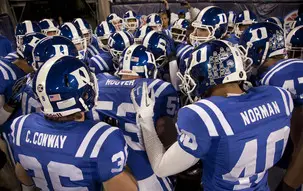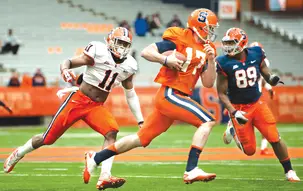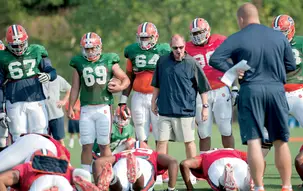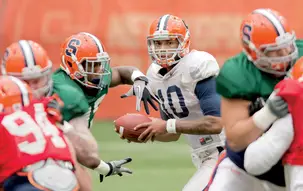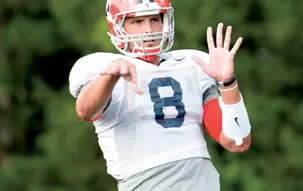To become the coordinator he is today, DeAndre Smith first had to take his talents out of the country.
After going undrafted in 1990 out of Southwest Missouri State — now Missouri State — he trekked north of the border to play in the Canadian Football League for a season. Then, in an unprecedented step to extend his playing career, Smith traveled across the pond to play in, of all places, France.
“The funniest thing about it,” Smith said, laughing as he reflected on his time in the French League, “was at halftime, guys were eating cheese and grapes and drinking coffee. That’s probably the funniest thing I’ve ever seen, that they’re eating lunch at halftime of a football game.”
Ten years later, he’s in the Atlantic Coast Conference, coaching Syracuse’s running backs in front of crowds sometimes as large as 40,000.
It’s a new perspective on the running game for the Orange after former running backs coach Tyrone Wheatley followed Doug Marrone to the Buffalo Bills in January. Wheatley starred at Michigan and played 10 years in the NFL.
Smith’s only two professional seasons were spent outside of the United States, expanding his insight. And he was the one giving the handoffs, not receiving them.
“I think they become better football players when they learn why we’re doing things as opposed to how we’re doing it,” Smith said. “That part is why I like to think I’m unique when I teach my guys how to play.”
One of the first phone calls George McDonald made when he took control as SU’s offensive coordinator last spring was to Smith, who said it was a “no-brainer” to leave as running backs coach at the University of New Mexico and take the same role with the Orange.
Smith is tasked with coaching what is arguably Syracuse’s deepest and most talented position. The Orange rushed for 369 yards in its Pinstripe Bowl victory over West Virginia. Wheatley also mentored a 1,000-yard rusher in each of his three seasons with Syracuse.
But Smith is eagerly up to the challenge of matching his predecessor.
“I know Coach Wheatley did a great job with those guys,” Smith said, “but I’m excited because we have that opportunity to continue to be as good as they’ve been in the past.”
In his 14 years of coaching, Smith has guided three All-Americans, nine 1,000-yard rushers and three NFL products: Garret Wolfe, Mikel Leshoure and two-time Pro Bowler Michael Turner.
“He’s a technician,” junior running back and team captain Jerome Smith said about the running backs coach. “He’s made me detail my work. I overlooked a lot of the small things. He definitely made me humble myself, and now I’m ready to go.
“He knows all the little smart things about the game and he’s coached some really good guys in the past, so he knows what he’s talking about. He’s a smart guy.”
A St. Louis native, Smith ran for 40 touchdowns and nearly 2,276 yards in his college career at Southwest Missouri State — as a quarterback.
The standout option quarterback earned 1990 first-team All-American honors, the 1990 Division I-AA National Offensive Player of the Year and the Gateway Conference Offensive Player of the Decade from 1985-95 – the league’s first 10 years of existence.
“A lot of people liked to classify me as that ‘fourth running back’ in the wishbone offense,” Smith said. “I was a runner. Early in my career, that was my label. Later in my career, I tried to add the passing game to it and it worked out.”
His 405 passing yards against Tulsa in 1990 set a program record, and he completed 57 percent of his passes throughout his four-year career.
He then took his talents outside of the United States to play in the Canadian Football League – and then in France.
His time in the French League was memorable, and not just because of the 1993 championship he won with the Aix-en-provence Argonauts at the back end of an undefeated season.
“For a kid like me, it was a great experience,” Smith said. “Got a chance to see the world and it was something that I’ll always cherish being able to do.”
Smith started his coaching career as the offensive coordinator and quarterbacks coach at Indiana State. When Northern Illinois was searching for a new running backs coach before the 2001 season, he was recommended to Joe Novak, then the head coach at NIU, who brought Smith in despite his inexperience as a backfield instructor.
“This business is about who you know,” Smith said. “I had no idea how to coach running backs at all. He didn’t care. He just wanted good people around his program.”
The gamble paid off, as Smith’s expertise as a signal caller has made him an effective running backs coach with programs such as New Mexico, Illinois and UNLV.
“We don’t just talk about what the running backs do,” Smith said. “We look at safeties, we look at linebackers, we do rotations with coverages and things like that.”
SU head coach Scott Shafer said he likes the Orange’s numbers at running back, and is looking to utilize that depth on special teams, particularly in the return game.
It’s a plan that could jeopardize the health of Smith’s group, but Smith knows how he’s going to handle the halfback position the Orange will depend so heavily on in 2013.
“I try not to think about that we’re the deepest group or anything like that,” Smith said. “I’m just thankful I have the opportunity to coach them.”

